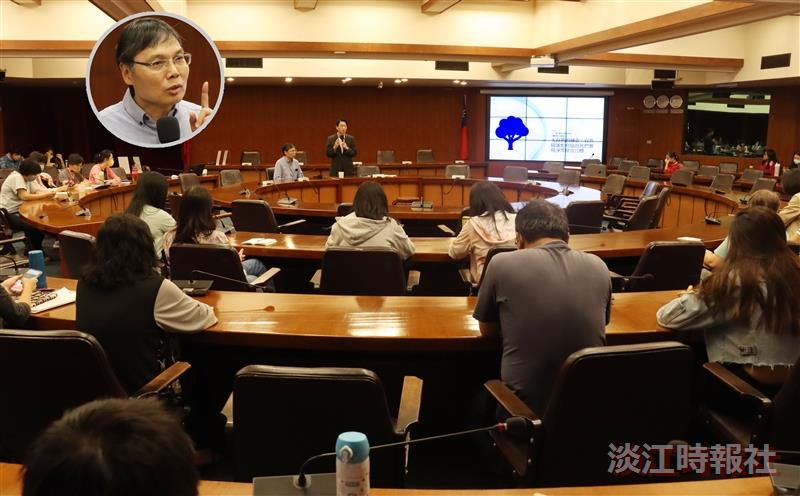News and Events
Administrative Staff Training: Dr. Chi-Wang Li Talks on Natural Carbon Sink
Date 2023-10-30 765 Clicks

Administrative Staff Training held by the Office of Human Resources: Dr. Chi-Wang Li from the Department of Water Resources and Environmental Engineering Talks on Natural Carbon Sink
On October 23 in the Ching- Sheng International Conference Hall, the Office of Human Resources held an "Administrative Staff Competency Training," inviting Prof. Chi-Wang Li from the Department of Water Resources and Environmental Engineering, who is also the head of the Net Zero Promotion Section under the Sustainability Center, to share insights on "The Wonders of Nature: How Natural Carbon Sink Helps Us Achieve Net-Zero Emissions Goals." The event was conducted simultaneously at both the Taipei and Lanyang campuses through video conferencing, and approximately 100 faculty and staff members attended. Dean of Human Resources, Dr. Yi-Nan Lin, explained at the opening remarks that the "AI+SDGs=∞" is the university's mid- to long-term development vision, and a goal in recent years, with various policies implemented to support this vision. To further enhance the knowledge of the staff about relevant issues, ongoing competency training programs are being organized. He expected everyone to collectively work towards achieving net-zero carbon emissions.
Dr. Li began by pointing out that people often handle tasks in their accustomed ways. However, with the progress of time, many things can be achieved more conveniently through alternative means. Therefore, the significance of "identifying problems" and "solving problems" has become extremely important. He then discussed the 2023 Sustainability Report compiled by the university, with "Net Zero Carbon Emissions" being one of the key disclosure topics. Currently, the university is compiling statistics on carbon emissions and planning corresponding strategies. Moreover, countries around the world, including Taiwan, are actively implementing "Carbon Border Adjustment Mechanisms." Taiwan is also focusing on planning net-zero pathways in 5 key areas: "construction," "transportation," "industry," "electricity," and "negative carbon support" in an effort to achieve the "2050 Net Zero Carbon Emissions". Tamkang has already established a solar photovoltaic system and is exploring other carbon reduction methods. Dr. Li also emphasized that various forms of renewable energy generation can have potential risks and lead to different issues that need to be carefully managed.
As for what is "natural carbon sinks," Dr. Li explained that the Earth itself has various natural ways of absorbing and storing carbon dioxide. For example, water and soil can absorb CO2. Additionally, there are artificial methods, such as technological methods to capture CO2, known as "artificial carbon sinks." He emphasized that it is currently impossible to achieve "completely zero carbon emissions," but it's possible to reach net zero by adopting negative carbon methods. Therefore, he suggested that the university could consider strategically planting tree species with strong carbon absorption capabilities, seeking support from faculty members with relevant academic expertise, establishing a "Chief Sustainability Officer" within the university clubs to calculate the carbon emissions generated during events to gradually instill a net-zero concept among faculty, staff, and students.
SDGs #SDG04 Quality Education #SDG07 Affordable and Clean Energy #SDG13 Climate Action #SDG17 Partnerships for the Goals
LINKS
- PREV:Space Education Activities by Aerospace Engineering Department Ignite Students' Enthusiasm 2023-10-30
- NEXT:Full-time Faculty Members Teaching in All-English will be Rewarded the Reduction of Course Credits from 2024 Academic Year 2023-10-30
- Formosa Scholarship Donor Visits President at School 2024-04-08
- Crossing Seas for Exchange with Waseda University: Dr. Chiu-Kuei Tseng Visits Haruki Murakami 2024-04-08
- TQM Seminar: Exploring New Chapters in Leadership Wisdom and Green Practices Together 2024-03-29
- Mass Communication Alumnus Chien-Hung Lien's Work Salli Wins Award in Osaka 2024-03-25
- 256 Young and Aged Volunteers Served at the Wan Jin Shi Marathon 2024-03-25
- North Tamsui USR Project: 10 Delicacies Revive Mackay’s Missionary Journey in Taiwan 2024-03-25
- Administrative Unit Digital Transformation and Net Zero Exhibition, President Keh Acknowledge Smart Initiatives for Sustainability 2024-03-25
- 2024 Net Zero Transition Alliance Summit: Inviting Alumni Enterprises to Collaborate in Cultivating Sustainability Talents 2024-03-16
- Alumni Reunion Spring Feast: Samuel Su and Jian-Fu Li Lead Singing of School Anthem, Andy Chen Donates NT$16.25 Million 2024-03-16
- Tamkang Shines at University Expo, Faculty and Students Unite in Recruitment Efforts 2024-03-11